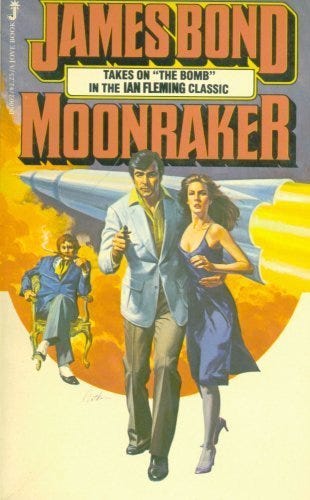I have read Moonraker (1955) by Ian Fleming (1908–1964) twice, each time a rewarding experience.
In late summer 1987 I read it at an isolated Ohio farmhouse. It was an all-night one-sitting event: I was too jazzed from finishing Pet Sematary for my then-undiagnosed Asbergers to let sleep trump the guilty pleasures of more pop fiction. What stayed with me from that first encounter was the nighttime car chase from London to the south coast, as Bond pursued Hugo Drax.
[....] Drax was over the crossing and away again, but not before Bond had seen that Krebs was beside the driver and there was no sign of Gala except the hump of a rug over the narrow back seat.
So there was no question. You don’t take a sick girl for a drive like a sack of potatoes. Not at that speed for the matter of that. So she was a prisoner. Why? What had she done? What had she discovered? What the hell, in fact, was all this about?
Each dark conjecture came and for a moment settled like a vulture on Bond’s shoulder and croaked into his ear that he had been a blind fool. Blind, blind, blind. From the moment he had sat in his office after the night at Blades and made his mind up about Drax being a dangerous man he should have been on his toes. At the first smell of trouble, the marks on the chart for instance, he should have taken action. But what action? He had passed on each clue, each fear. What could he have done except kill Drax? And get hanged for his pains? Well, then. What about the present? Should he stop and telephone the Yard? And let the car get away? For all he knew Gala was being taken for a ride and Drax planned to get rid of her on the way to Dover. And that Bond might conceivably prevent if only his car could take it.
As if to echo his thoughts the tortured rubber screamed as he left the South Circular road into A20 and took the roundabout at forty. No. He had told M. that he would stay with it. He had told Vallance the same. The case had been dumped firmly into his lap and he must do what he could. At least if he kept up with the Mercedes he might shoot up its tyres and apologize afterwards. To let it get away would be criminal.
So be it, said Bond to himself....
For years I thought back on that scene every time I climbed behind the wheel. Nothing I read beat it until the penultimate chapter of Adam Hall's 1966 thriller The Ninth Directive.
* * *
My second read of Moonraker took place in May 2015.
This time, the car chase receded in dramatic impact. But the novel's slingshot ending, with utter poignancy, is stunning in its eloquence as Fleming draws together the novel's various threads.
There was silence in the room and Bond shifted in his chair to ease the pain that was creeping back into his body.
The same pigeon as on Monday, or perhaps another one, came to rest on the window-sill with the same clatter of wings. It walked up and down, nodding and cooing, and then planed off towards the trees in the park. The traffic murmured sleepily in the distance.
How nearly it had come, thought Bond, to being stilled. How nearly there might be nothing now but the distant clang of the ambulance bells beneath a lurid black and orange sky, the stench of burning, the screams of people still trapped in the buildings. The softly beating heart of London silenced for a generation. And a whole generation of her people dead in the streets amongst the ruins of a civilization that might not rise again for centuries.
All that would have come about but for a man who scornfully cheated at cards to feed the fires of his maniac ego; but for the stuffy chairman of Blades who detected him; but for M. who agreed to help an old friend; but for Bond’s half-remembered lessons from a card-sharper; but for Vallance’s precautions; but for Gala’s head for figures; but for a whole pattern of tiny circumstances, a whole pattern of chance....
* * *
99 Novels: The Best in English Since 1939 (1984) by Anthony Burgess was the prompt in 1987 that pointed me at Ian Fleming.
Cutting through every layer of twenty-one year old smugness and pretension with which I preened and strutted, Burgess wrote:
[....] Fleming raised the standard of the popular story of espionage through good writing — a heightened journalistic style — and the creation of a government agent — James Bond, 007 — who is sufficiently complicated to compel our interest over a whole series of adventures....
[....] The James Bond films, after From Russia With Love, stress the fantastic and are inferior entertainment to the books. It is unwise to disparage the well-made popular. There was a time when Conan Doyle was ignored by the literary annalists, even though Sherlock Holmes was evidently one of the great characters of fiction. We must beware of snobbishness.
That phrase "beware of snobbishness" was a clarion call for me: away from snobbish interest in Sartre, Robbe-Grillet, Roth, and Bellow -- back to Conan Doyle, Somerset Maugham, and Gore Vidal.
How nearly it had come out differently.
Jay
28 May 2023





